 Turkey Red Journal
Turkey Red Journal

| Volume 18 Issue 1 | A Journal Dedicated to Natural Dyes | Spring 2013 |
| Nature's Gallery |
| Shelly Jyoti and Laura Kina |
This issue's Gallery features the works of two artists, Shelly Jyoti and Laura Kina, from their joint exhibitition Indigo, which is at the Chicago Cultural Center until April 2, 2013. |
||
Indigo Exhibition Statement |
||
|
Employing fair trade artisans from women's collectives in India and executing their works in indigo blue, Indian artist Shelly Jyoti and US artist Laura Kina's works draw upon India's history, narratives of immigration and transnational economic interchanges. Shelly Jyoti's Indigo Narratives refers to India's history of 19th century indigo farmers, their oppression in deltaic region and Mahatma Gandhi's subsequent non-violent resistance that began India's freedom struggle (Champaran movement 1917-18). The works utilize traditional embroidery by rural women in Bhuj (Gujarat) with support of Shrujan: Threads of Life and indigo resist dyeing/ printing on khadi fabric with the 9th generation ajrakh artisans of Gujarat. Laura Kina's Devon Avenue Sampler is a portrait of her diasporic South Asian/Jewish Chicago neighborhood of West Roger's Park and features a bricolage of pop street signage rendered in patchwork quilt paintings by the artist as well as works that were hand embroidered by artisans from MarketPlace: Handwork of India, a fair trade women's organization in Mumbai, India.
Despite coming from vastly different backgrounds, Jyoti and Kina decided to collaborate in 2008 after seeing that they share a mutual interest in textiles, pattern and decoration, and Asian history. They began by thinking about the Silk Road intersections of their own ethnic and national positions in relation to fabrics. Jyoti lived for many years in Gujarat India, a region famed for their bold embellished textiles and as the home of Mahatma Gandhi. Kina was born in California to an Okinawan father from Hawaii and an Anglo/Basque American mother from the Pacific Northwest. She now lives and works in Chicago's "Little India," a vibrant multiethnic immigrant community. The common thread between their complimentary bodies of work is the color indigo blue from India's torrid colonial past, to indigo-dyed Japanese kasuri fabrics and boro patchwork quilts, through blue threads of a Jewish prayer tallis, to the working class blue jeans in the United States. | ||
Laura Kina |
||
| Devon Avenue Sampler: Golda Meir/Gandhi Marg Hand embroidery on khadi fabric. 16"x40", 2009 | ||
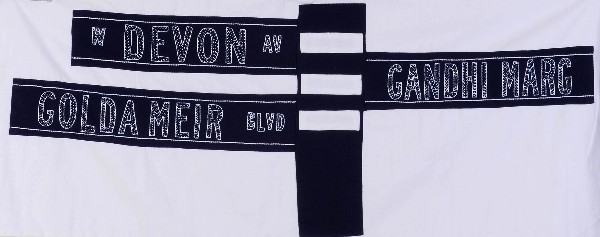 Photograph by Colin Lyons. Copyright Laura Kina. |
||
| Devon Avenue Sampler: Mehndi Hand embroidery on khadi fabric. 18"x10", 2009 | ||
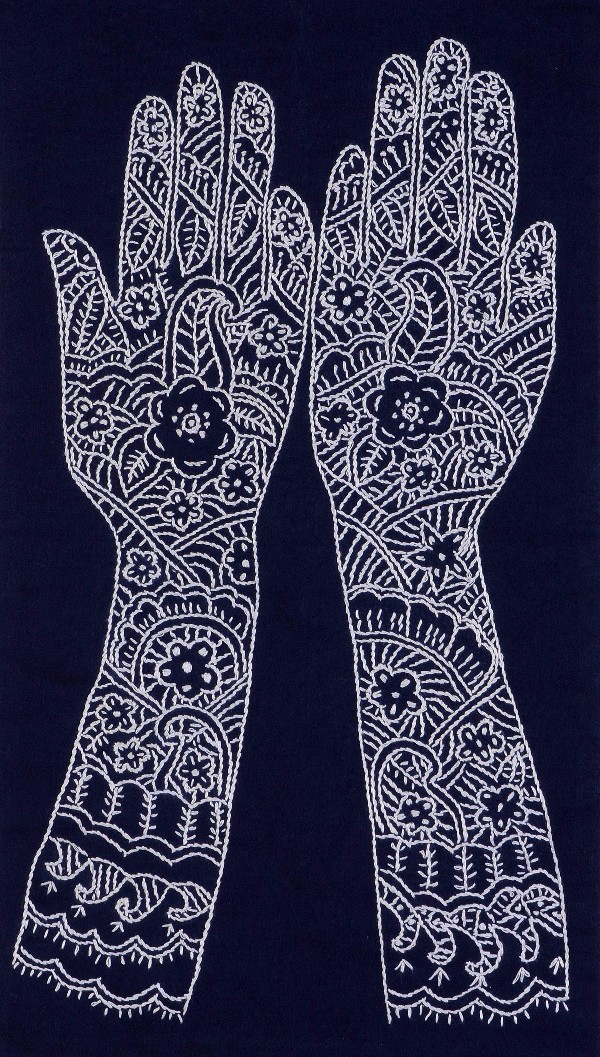 Photograph by Colin Lyons. Copyright Laura Kina. |
||
| Devon Avenue Sampler: New York Kosher Hand embroidery on khadi fabric with mirrors. 24"x16", 2009 | ||
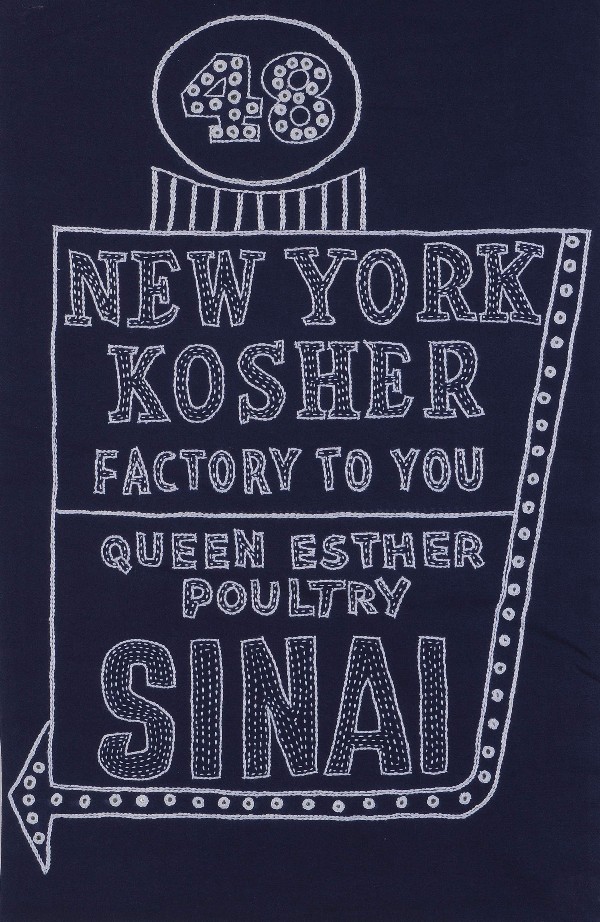 Photograph by Colin Lyons. Copyright Laura Kina. |
||
| Devon Avenue Sampler Acrylic on patchwork quilt. 53"x77", 2009 | ||
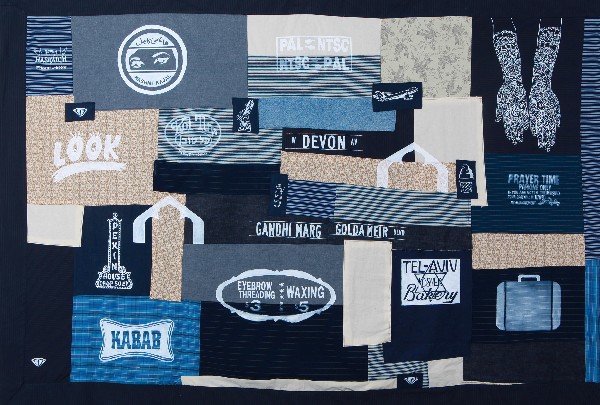 Photograph by Colin Lyons. Copyright Laura Kina. |
||
| Devon Avenue Sampler: Pay to Park Acrylic on patchwork quilt. 60"x60". 2011 | ||
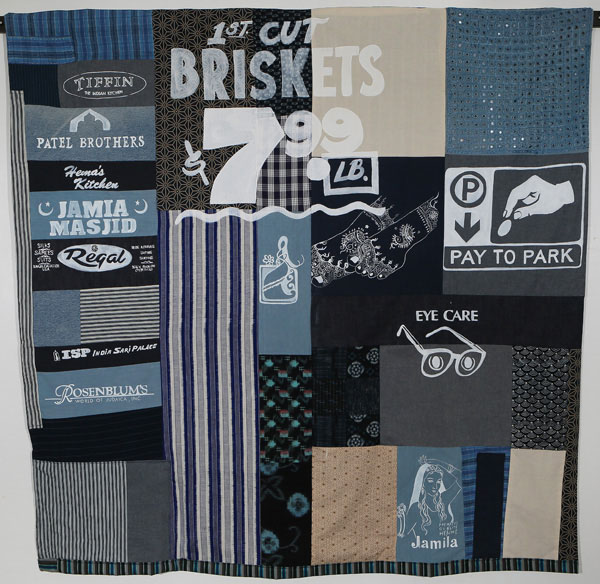 Photograph by Colin Lyons. Copyright Laura Kina. |
||
|
Laura Kina is Associate Professor of Art, Media, and Design and Vincent de Paul Professor at DePaul University in Chicago, IL.
ARTIST'S STATEMENT "Kina's work brings forth diaspora in all its colorful vivacity, and yet invokes the struggles inherent in migration and relocation." - Michelle Yee "Hers is a genre of Pop art with a distinctly postcolonial edge." - Murtaza Vali Devon Avenue Sampler features vintage and contemporary street signs and imagery from my West Roger's Park Chicago immigrant neighborhood where Orthodox Jews, Hindus, Muslims and Christians all live. This all-American urban South Asian/Jewish corridor is lined with jewelers, ethnic grocery stores, bakeries, spice shops, restaurants, colorful sari shops, travel & tour services, cell phone/electronics/luggage shops, beauty shops advertising eye brow threading and mehndi, and a baseball field. Using indigo blue colored thread and khadi fabric (two materials long associated with Mahatma Gandhi and symbolic of India's Freedom Movement from British colonization) along with a sprinkling of Gujarat style mirrored bling and Jewish inspired prayer shawl tassels, my samplings of Devon Avenue's poly-cultural street signs have been hand embroidered by artisans from MarketPlace: Handwork of India. MarketPlace is a fair trade women's collective based in Mumbai. The use of the word the word "sampler" in the series title thus refers to both embroidery samplers and "sampling" as in cultural appropriation. I have also sewn patchwork canvases of dark blue fabrics and denim reminiscent in form to Japanese indigo boro quilts to reflect my own mixed ethnic heritage in the background. On these collage-like constructions I hand painted iconography from street signs in my neighborhood. From 1930-1970s Devon Avenue was predominantly Jewish. My husband's family used to live and work here in the late 1950s to 1980. South Asian migration eclipsed the Jewish community beginning in the 70s-80s and as newer groups continue to arrive, the neighborhood remains in flux. The ethnic street signs record a quickly disappearing past as they collide, overlap, and fade into the present. |
||
Shelly Jyoti |
||
| Indigo Narratives: An Indigo Plant Ajrakh resist dyeing on khadi fabric. 60"x46", 2009 | ||
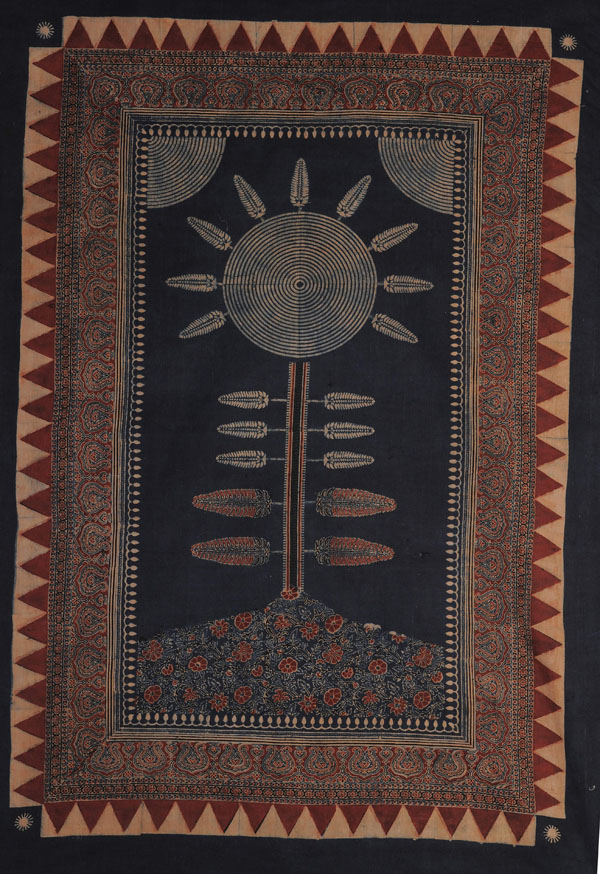 Photograph by Chetan Patel Baroda India. Copyright Shelly Jyoti. |
||
| Indigo Narratives: An Allusion to Stitches—An Indigo Leaf Acrylic on canvas, Sanskrit calligraphy designed embroidered patches. 40"x33", 2009 | ||
|
Photograph by Chetan Patel Baroda India. Copyright Shelly Jyoti. |
||
| Indigo Narratives: Modern Spinning Wheel 1 Ajrakh resist dyeing on khadi fabric. 46"x46", 2009 | ||
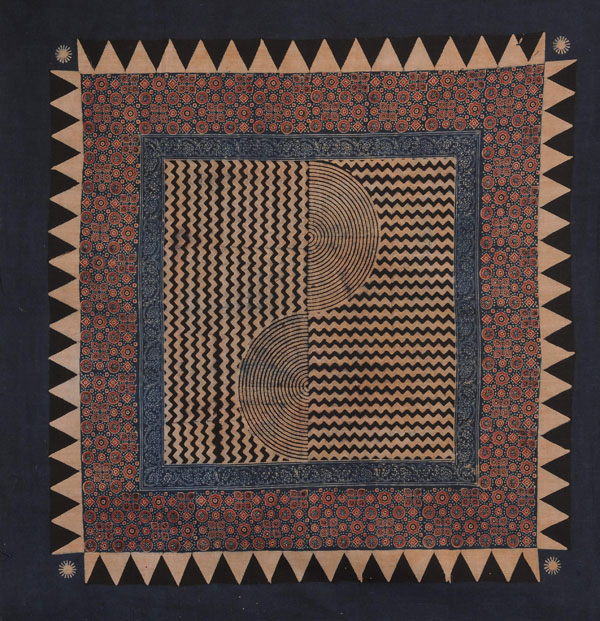 Photograph by Chetan Patel Baroda India. Copyright Shelly Jyoti. |
||
| An Allusion to Ajrakh: An Ode to Neel Darpan Ajrakh resist dyeing on khadi fabric. 46"x72", 2009 | ||
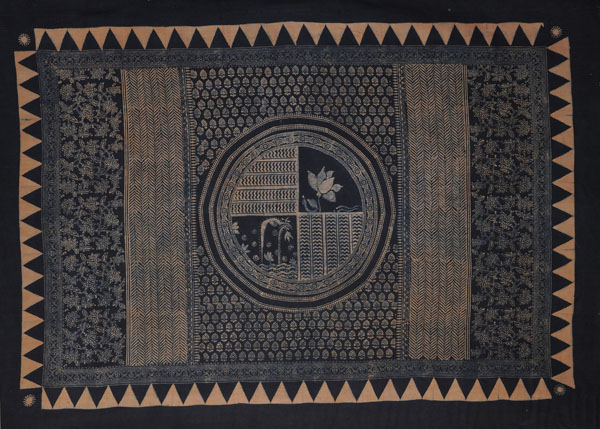 Photograph by Chetan Patel Baroda India. Copyright Shelly Jyoti. |
||
| Homage—Woeful Tales of the Ryots of Champaran 300 indigo resist print circular discs, 7 in. diameter each, 25 contemporary and traditional prints. Dimensions variable, approx. 20 ft. high, 2009-13. Installation view Chicago Cultural Center. | ||
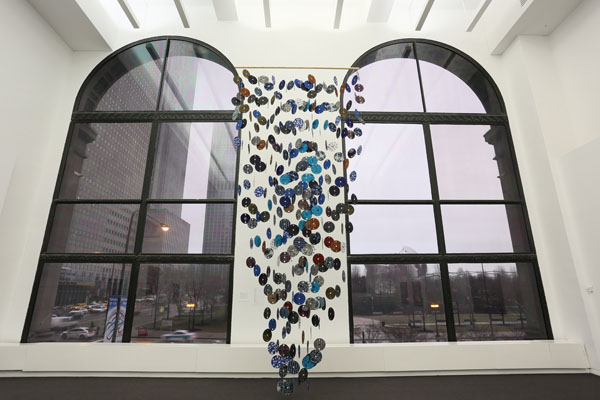 Photograph by Colin Lyons. Copyright Shelly Jyoti. |
||
Shelly Jyoti is a New Delhi based visual artist, fashion designer, poet and an independent curator whose work references designs and textiles of the 20th Century in the cultural context of Indian history.
ARTIST'S STATEMENT "Shelly uses linkage to develop a narrative by relying heavily on the narratives around the indigo movement and the legacy of indigo and craftwork handed over from generations to generations of traditional craftswomen." - Michelle Yee "Shelly's work bridges the elements of fashion and textiles into visual art context of documentation and conservation." - Johny ML My work is centered on historical iconographic elements, designs, and textiles of the 20th Century within the cultural context of Indian history. I explore and construct the hermeneutics of period histories within the socio-economic and political inquiry in my art practice. Indigo Narratives (2009-12) features sculpture, installation and paintings that incorporate hand embroidered textiles, ajrakh printing on khadi, and Sanskrit calligraphy. My narratives are inspired by the accounts of the tyranny of British colonial indigo planters on native farmers of chamaparan and Mahatma Gandhi's subsequent intervention in Bihar 1917-18, the first satyagrah led by Gandhi on the Indian soil after his fight against racialism in South Africa. The works engage textile references of coastal Gujarat, literary texts such as Neel Darpan through the history of India's colonial past along with references to indigo plant/color/dye. The use of ajrakh printing on khadi utilizes indigo techniques, which are used by Khatris, the immigrants from Sindh and Baluchistan during 1600 C.E. Through this process I examine the implications of personal, political and cross-cultural choices of these communities. Working with 9th generation ajrakh artisans in Bhuj in the interior of Gujarat on khadi fabric with ancient indigo resist printing techniques, my designs, however, are entirely contemporary interpretations of the politics of indigo. Also incorporating traditional needlecraft designs motifs of different clans by artisans from fair trade women's collectives such as Shurjan: Threads of Life and thus helping contribute to providing sustainable means of income for some of India's under-privileged women. To me, textiles created for artwork performs a great sense of preservation as a visual medium for documentation purpose than compared to functional textiles. Both have symbolic purposes. My artwork challenges me to apply this vision of traditional pattern block and color in the context of a socially and environmentally responsible design practice. Through my contemporary design motifs and presentation I strive to present the viewer with a heritage so rich and color so historically meaningful, in today's context of technique and its conservation. |
||
| Web Resources View Indigo press: http://shellyjyoti.com/press/ View the online exhibition catalog: www.laurakina.com/indigo-culturalcenter.html View Indian artist Shelly Jyoti's work: www.shellyjyoti.com/indigo-narratives View US artist Laura Kina's work: www.laurakina.com/devon.html |
||